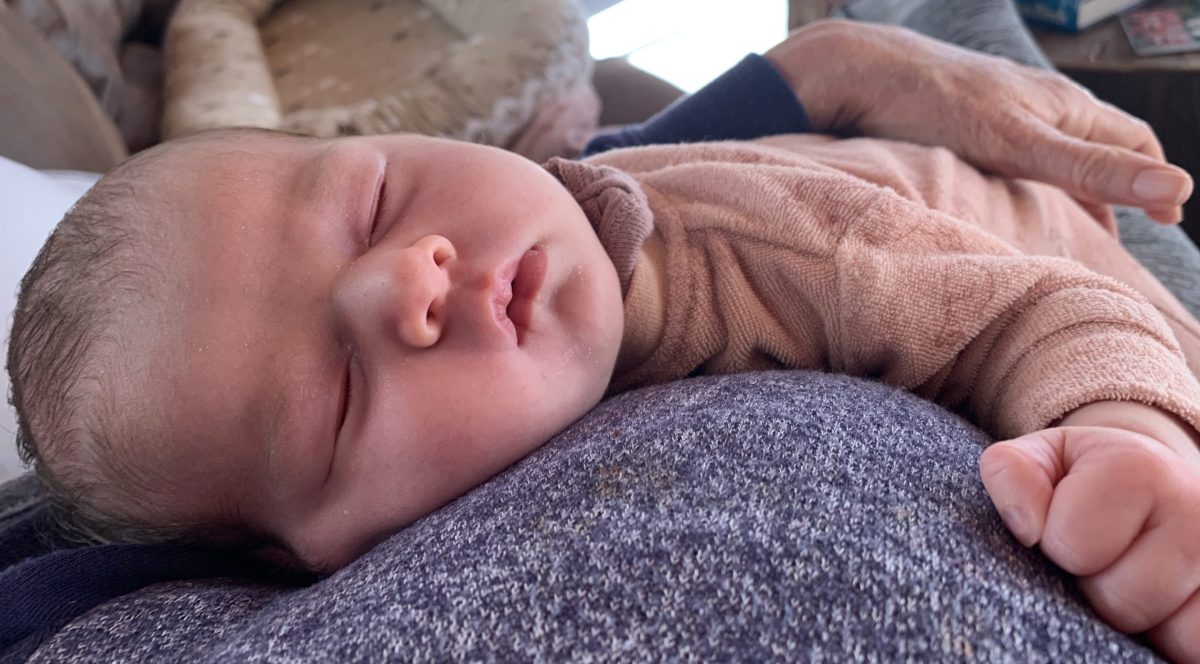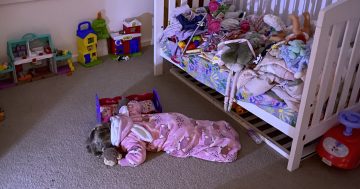
I’d love to be able to sleep like a baby. Photo: Kim Treasure.
Warning: This column may put you to sleep.
Correction: It may help you to sleep. If you’re anything like me, you’ll have nights where sleep is as elusive as tickets to a Taylor Swift concert. We’re not alone – one in three Aussies will have nights where we just can’t get to sleep, or wake up and can’t get back to sleep.
There are nights when I would do anything to find the off switch to my brain.
I’ll exhaust all the usual methods – counting backwards from 100, deep breathing, placing those pesky thoughts on a fluffy white cloud to slowly move away and when that doesn’t work, gently putting them on a leaf in a stream to softly drift off into tomorrow land.
We all know the basics that (should) lead to a good night’s sleep – cut out the caffeine in the afternoon/evening, no screens in the bedroom, a comfortable temperature and bedding, etc, etc. I’m sure parents of young kids would love to be able to follow the other handy piece of advice – “If possible, don’t allow children and pets to be a disturbance” – yeah, right.
The really annoying thing about sleep is there are so many things that can bugger it up – stress, anxiety, medication, hormones, alcohol, food, etc, etc.
I’ve been working on my “sleep hygiene”, the buzzword my doctor likes to use when I complain about my body’s inability to shut down and let me sleep.
Apparently sleep hygiene has nothing to do with having a shower before bed or slipping into clean sheets – although they’re valid suggestions.
According to the US Sleep Foundation – “because your sleep is our business” – sleep hygiene is about optimising your sleep schedule, pre-bed routine and daily routines, part of harnessing habits to make quality sleep feel more automatic.
Sounds beautiful but it just ain’t happening. So, as one does these days, one turns to Dr Google for help.
Boy, was that a revelation. Clearly I’m not the only one who’s desperate for the average seven to nine uninterrupted hours of sleep. It turns out there’s a whole industry dedicated to helping people get a good night’s sleep.
There’s not-for-profit groups, clinics, medical organisations, academics (with titles like Sleep Psychologist and Insomnia Specialist) and if you don’t trust the experts there are pages and pages of handy hints to help you sleep like a baby.
Some of the “guaranteed to work” solutions just make my tired, addled brain hurt even more.
Have you heard of the 10-3-2-1-0 sleep rule? Ten hours before bed = no more caffeine; three hours before bed = no more food or drink; two hours before bed = no more work; one hour before bed = no more screen time; 0 = number of times you hit the snooze button. (Snoozing is bad news – pressing the snooze button disrupts REM sleep. It can even trigger a fight-or-flight response. Great.)
That all sounds logical – and more like a routine than a rule – but I’d have to set an alarm to remind myself and I’d probably just hit the snooze button.
I was excited by Healthline’s promise to cure insomnia in 12 minutes. That was until I read the fine print – “For the best results, give these strategies a chance to work. Aim for at least 12–30 minutes”.
I’m old enough to know that if something sounds too good to be true then it probably isn’t true.
If you’re still desperate for some shut-eye, you can pay for the privilege at a sleep hotel.
Yep, instead of using your hard-earned leave allowance to travel and experience wondrous new and amazing things, you can book into a sleep hotel. Sorry family, not taking that trip to England next year, I’m booking into a sleep hotel instead. Have fun without me.
They’re popping up around the world, taking advantage of the sleep-deprived through offerings such as smart beds, pillow menus, calming music and mists, special menus and blue-light blocking glasses.
A quick google for “sleep hotels Sydney” reveals the Emma Sleep Hotel at the top of the list, declaring itself to be “the first ever sleep hotel and sleepgustation in Australia”. And yes, I checked to see if it was dated 1 April.
“Guests were greeted at entry by the Emma Sleep Hotel’s resident Snoreman, and guided to the Rest-ception for a 2 pm tuck-in in our 10 custom Sleep zzZ-uites uniquely designed by Emma’s global Dream Team of snooze-ologists to cater to different types of sleepers.” Sleep-deprived guests can even choose from a room service menu that includes guided meditation or a bedtime story.
Enough, please.
It’s all too easy to be flippant about troubled sleep – one bad night is annoying, but generally tolerable.
However, when it becomes a habit it can also pose serious health risks, both physically and mentally.
According to Australia’s Sleep Health Foundation: “Untreated insomnia can lead to various health issues, including an increased risk of cardiovascular problems, mood disorders, and decreased daytime productivity.”
It’s enough to keep you up at night worrying.
The bottom line is if sleep is a problem, see your doctor. They probably won’t suggest a sleep hotel, but they will be able to offer more help than Dr Google.
I think I need a good lie-down.
Original Article published by Jen White on Region Illawarra.








